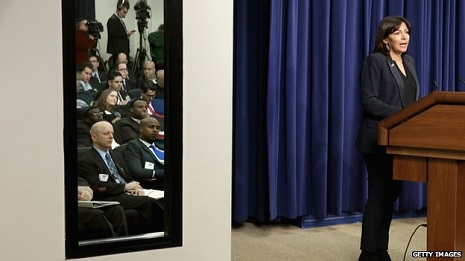The mayor of Paris, Anne Hidalgo, spoke in halting English at the White House summit on Wednesday - though her message was forthright.
"When we are together, we are most strong," she told police officers, FBI agents, European mayors and others gathered in a windowless auditorium for a conference on countering violent extremism, a three-day event held this week in Washington.
She was dressed French-chic in fitted black pants and a black top with a dark jacket, and the colours captured the sombre mood in the room.
Extremists killed 17 people in attacks on the offices of Charlie Hebdo magazine and at a Jewish supermarket in Paris in January.
Ms Hidalgo joined a unity march on the streets of Paris a few days later. She walked with UK Prime Minister David Cameron, German Chancellor Angela Merkel - and more than a million others
Not, however, with Mr Obama.
Afterwards people in the US and other countries were upset he wasn`t there.
"You let the world down," said a headline in the New York Daily News.
US officials seemed sensitive about the criticism. On the day of the march, Attorney General Eric Holder spoke about their plans to host a summit.
The forum, according to White House officials, was designed to help "prevent violent extremists and their supporters from radicalising, recruiting or inspiring individuals".
There was another reason, too, a former US intelligence official told me - namely, to tamp down criticism of Mr Obama for not being at the Paris march.
A spokeswoman for the US National Security Council, Bernadette Meehan, says that`s nonsense.
"We`ve been publicly speaking about this summit months before the attacks in Paris," she says.
Still the planning seems a bit chaotic. Invitations to the summit went out to foreign embassies on 29 January, a State Department official told me.
At an event at the Atlantic Council in Washington on the following day, European officials said they still weren`t sure which minister would be appropriate to send to Washington.
Even those who are passionate about the goals of the summit - combating violent extremism - wonder about the optics - a term the Washington political class use to describe how an event is perceived.
One participant, a former State Department official, says there isn`t enough time to coordinate ministers for public appearances - one of the main goals for this kind of event.
Officials from France, Belgium, the UK, and other countries are attending. Mr Obama is expected to address them at the State Department on Thursday.
Whether hastily pulled together or carefully orchestrated, the summit to counter violent extremism is timely.
Speaking at the White House summit, a Belgian mayor, Hans Bonte, describes people from his city, Vilvoorde, who have joined extremist groups in Iraq and Syria.
"They are seen in awful video movies," he says.
He believes dozens more people are now preparing to leave Belgium to join the extremist groups.
"We are facing a global problem," Mr Bonte says. "But we have to act locally."
Regardless of the politics - and the optics - of the summit, he and the others are facing the difficult task of trying to stop acts of violence. However flawed, the summit is better than nothing.
More about:
















































